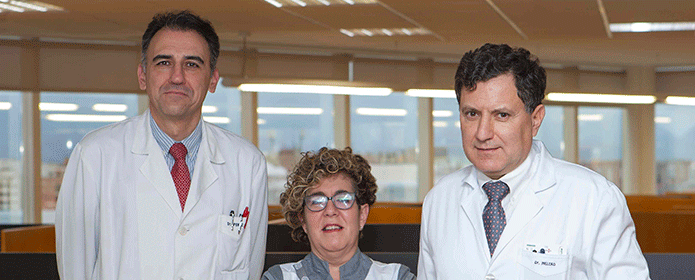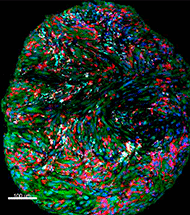Combined immunotherapy and surgery treatment shows beneficial effects in the most common malignant brain tumor
Researchers from Clínica Universidad de Navarra and Cima confirm in a clinical essay that this approach is safe in 30 patients with glioblastoma.


Glioblastoma is the most frequent malignant brain tumor. Its incidence is 3 new cases per year per 100,000 inhabitants and it appears most frequently between 45 and 70 years of age. It is a very aggressive disease, whose conventional treatment includes surgery accompanied by radio and chemotherapy, but the survival rate is leave, since the tumor recurs in most cases.
Researchers from the Clínica Universidad de Navarra and the Cima have shown that the combination of immunotherapy and surgery is safe in 30 patients with glioblastoma. The results of this clinical essay , developed in partnership with Dr. Kurt Schalper of Yale University (United States), were made public yesterday in Nature Medicineone of the most relevant medical journals.
The work has focused on a phase II clinical essay in 30 patients (27 with recurrent glioblastomas and three newly diagnosed). "We administered a dose of nivolumab (an immunotherapy drug effective in other indications, such as metastatic melanoma) before tumor surgery, followed by post-surgical doses until disease progression," explains Dr. Ignacio Melero, researcher senior at Cima, co-director of department Immunology at Clínica Universidad de Navarra and co-author of essay.
The researchers analyzed changes in the tumor immune microenvironment before and after nivolumab administration, using surgical specimens. They also compared it with tumor tissue from patients who had not received nivolumab. "Through multiple molecular and cellular analyses we proved that administration of the immunotherapy drug produces a local immunomodulatory effect. Moreover, in two patients, who received the treatment before and after their first surgery, the disease has not reappeared after two and a half years of follow-up," confirms Dr. Melero.
Surgery and new drug combinationsAccording to neurosurgeon Ricardo Díez-Valle, co-author of work, "the most complete resection possible, guided by fluorescence and intraoperative MRI, maximizes the results of this treatment and other immunotherapy approaches that will be developed in the future".
The work of the Clínica Universidad de Navarra and Cima coincides with the results of another essay clinical trial of neoadjuvant immunotherapy against glioblastoma coordinated by researchers at the University of California, Los Angeles (UCLA), and published in the same issue of Nature Medicine. The researchers note that this treatment subject prevents or delays tumor recurrence in a percentage of patients, and confirms that changes occur in the immune cells of the removed tumor.
Dr. María Rodríguez-Ruiz, co-author of work, adds that "it is possible that combinations of new immunotherapy drugs will be used to look for synergistic effects in the next trials".
"These findings are preliminary but point to the fact that the use of immunotherapy used before the first glioblastoma surgery will be the most effective way to apply this treatment subject ," concludes Dr. Melero.
-
reference letter bibliography
"Neoadjuvant nivolumab modifies the tumor immune microenvironment in resectable glioblastoma".
